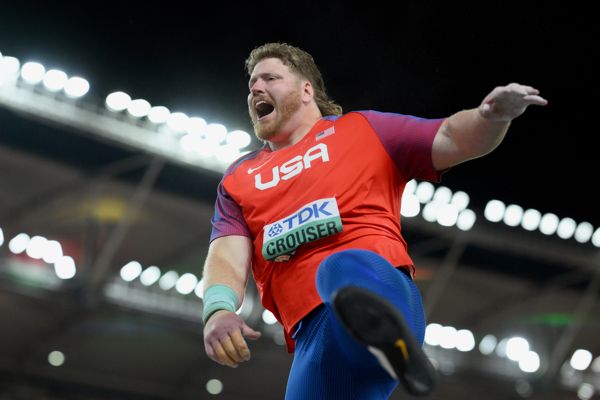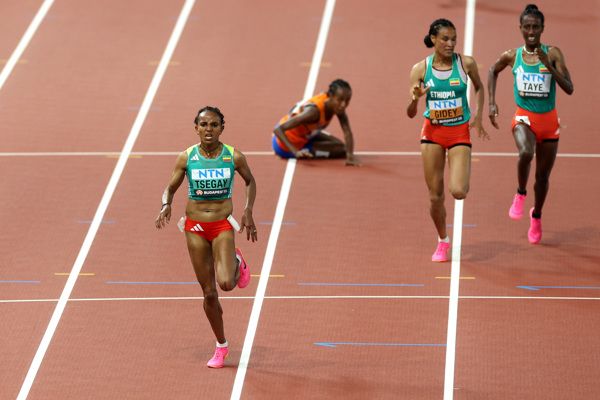In the end, nothing could stop the big shot from stealing top billing on the gripping opening night of action at the World Athletics Championships Budapest 23.
His preparations might have been rocked by the sudden discovery of two blood clots in his legs, but Ryan Crouser overcame all possible obstructions as he retained the world title he claimed in his home state of Oregon last year – in the process becoming the first man in history to land double world and Olympic shot put titles.
He did so in style. Big style. Leading from the first throw of the competition, he twice bettered the championship record he set in Oregon in 2022 – with 22.98m in round two, and then with a stunning 23.51m in round six, just five centimetres shy of the world record he nailed in Los Angeles in May.
Crouser might hail from Boring, Oregon, but the thrillingly intriguing individual is taking his event into whole new dimensions with his innovative slide technique.
As he sank to his knees in celebration after his final throw, the man who is redefining his event might have reflected what he could possibly achieve with a trouble-free build up to a major event. We shall doubtless find out when he goes for an Olympic hat-trick in Paris next year.
The 30-year-old is unbeaten now in nine competitions indoors and out this year. Having donned his cloak of invincibility, he celebrated in his trademark cowboy hat in the aftermath of a competition that drew parallels of sorts with the epic shot put showdown in Doha in 2019.
On that occasion, just one centimetre separated the three medal winners and the top four all ventured beyond 22 metres. This time, again, the top four all breeched 22 metres.
In the Qatari capital, Crouser was denied the gold medal by one centimetre, losing out to his US teammate and long-time rival Joe Kovacs. In Hungary, Crouser won by a huge margin of 1.15m, the inspired Italian Leonardo Fabbri claiming silver with a lifetime best of 22.34m.
Kovacs took the bronze with 22.12m and was happy to do so in his family’s historical homeland. His beloved grandfather emigrated to the US from Hungary. “I was lucky enough to travel with him back to his home town of Szentpeterfa,” said the two-time world champion, who finished fourth at this year’s US Championships and only made the team because of Crouser’s wild card.
Fourth at last year’s World Championships in Oregon and fourth again in Budapest, New Zealander Tom Walsh will have taken scant consolation in his own 22-metre-plus throw, his 22.05m having been seven centimetres short of earning the 31-year-old a ninth global medal indoors and out.
The night, however, belonged to Crouser, who could breathe a huge sigh of relief after all of the behind-the-scenes anguish of the preceding two weeks. “That was a tough one,” he said. “The last throw was testament to all the hard work and dedication over the last year.
“The last few days have been hard. With all that has happened, it was a phenomenal throw.”
Crouser set his stall out with the opening throw. Wearing tights to protect his legs, he launched his shot out to 22.63m. Only one of his rivals had thrown farther in 2023 – Kovacs – and even then only by six centimetres.
Follow that, then.
In qualifying, Darlan Romani topped the combined pools, uncorking a season’s best of 22.37m. The Brazilian who beat Crouser to the world indoor title in Belgrade last year could only manage 21.31m with his first effort in the final.
With Walsh fouling, Kovacs slotted into second spot with 21.55m. There was a big gap to the rest of the field: Serbia’s Armin Sinancevic lying fourth with 20.78m.
It was Crouser himself who provided the emphatic response. His second-round throw sailed out to 22.98m, drawing a collective gasp from the crowd at the National Athletics Centre. Justifiably so.
With one fell swoop, the reigning champion and No.1 contender eclipsed the championship record he set in his home state last year, 22.94m – and metaphorically extracted the wind from the sails of his rivals.
Jacko Gill temporarily graduated to third, throwing 21.46m, but Kovacs registered a foul and Romani could make no improvement, throwing 21.10m.
The big question was whether Walsh could lay down a marker. He did to a certain extent, moving up into second place, though he was clearly far from happy with his 21.69m, making a ‘so-so’ gesture with his hands and shrugging his shoulders.
Not since April last year has Crouser failed to throw beyond 22 metres and he maintained his remarkable consistency with 22.28m in the third round.
Meanwhile, the Kiwi battle for second spot see-sawed. First Gill claimed it with 21.76m, then Walsh regained it with 21.93m.
Some 11,000 miles from home, the men from The Land of the Long White Cloud, and of the formidable All Blacks, were pushing one another towards a podium double. Or so it seemed.
Walsh was followed into the circle in the third round by Fabbri. With one mighty effort, the Italian propelled himself from ninth place to second, improving from 21.26m to 22.34m – a lifetime best by 35 centimetres.
Thus, at halfway, the provisional medal picture was: 1 Crouser 22.98m, 2 Fabbri 22.34m, and 3 Walsh 21.93m.
Thereafter, with Crouser and Fabbri failing to register a mark in rounds four and five, the big changes came immediately behind. Gill found himself shunted down to sixth after Kovacs improved to 21.88m and Payton Otterdahl to 21.78m, Crouser’s US teammates moving up to fourth and fifth.
The competition got fiercer in the penultimate round, Kovacs and Walsh following Crouser and Fabbri over the 22-metre line. Kovacs dislodged the Kiwi from third place with 22.12m. Walsh responded with his best throw of the night, 22.05m. So did Otterdahl, a heavyweight Dick Wottle in his baseball cap, improving to 21.68m in fifth.
And that was that. Only Crouser managed an improvement in the final round. A mighty one, drawing a mighty gasp of awe from the passionate Hungarian crowd.
Credit: World Athletics



